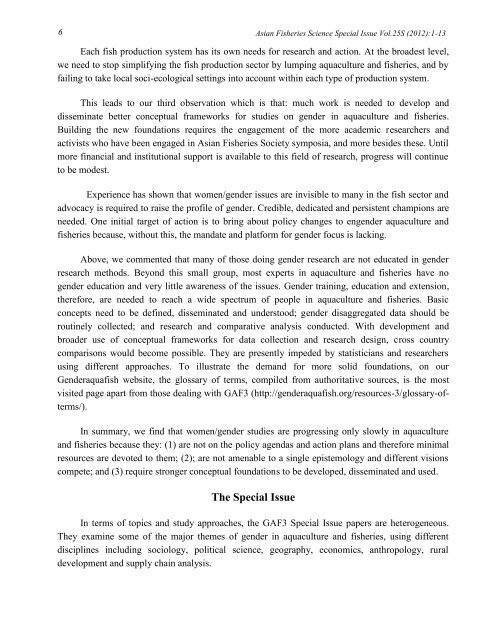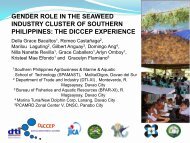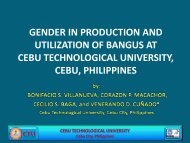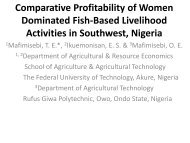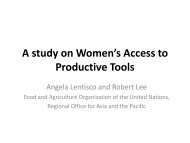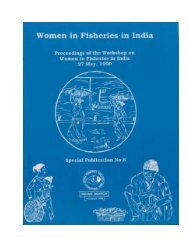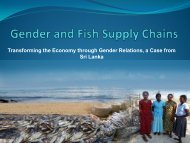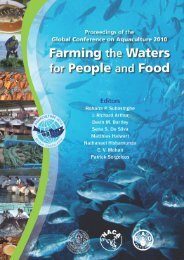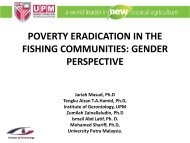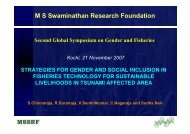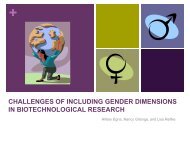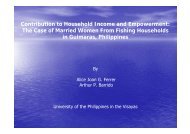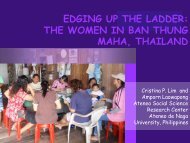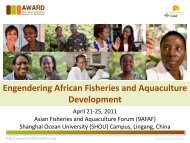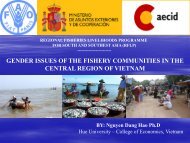Moving the Agenda Forward - GENDER IN AQUACULTURE AND ...
Moving the Agenda Forward - GENDER IN AQUACULTURE AND ...
Moving the Agenda Forward - GENDER IN AQUACULTURE AND ...
You also want an ePaper? Increase the reach of your titles
YUMPU automatically turns print PDFs into web optimized ePapers that Google loves.
6Asian Fisheries Science Special Issue Vol.25S (2012):1-13Each fish production system has its own needs for research and action. At <strong>the</strong> broadest level,we need to stop simplifying <strong>the</strong> fish production sector by lumping aquaculture and fisheries, and byfailing to take local soci-ecological settings into account within each type of production system.This leads to our third observation which is that: much work is needed to develop anddisseminate better conceptual frameworks for studies on gender in aquaculture and fisheries.Building <strong>the</strong> new foundations requires <strong>the</strong> engagement of <strong>the</strong> more academic researchers andactivists who have been engaged in Asian Fisheries Society symposia, and more besides <strong>the</strong>se. Untilmore financial and institutional support is available to this field of research, progress will continueto be modest.Experience has shown that women/gender issues are invisible to many in <strong>the</strong> fish sector andadvocacy is required to raise <strong>the</strong> profile of gender. Credible, dedicated and persistent champions areneeded. One initial target of action is to bring about policy changes to engender aquaculture andfisheries because, without this, <strong>the</strong> mandate and platform for gender focus is lacking.Above, we commented that many of those doing gender research are not educated in genderresearch methods. Beyond this small group, most experts in aquaculture and fisheries have nogender education and very little awareness of <strong>the</strong> issues. Gender training, education and extension,<strong>the</strong>refore, are needed to reach a wide spectrum of people in aquaculture and fisheries. Basicconcepts need to be defined, disseminated and understood; gender disaggregated data should beroutinely collected; and research and comparative analysis conducted. With development andbroader use of conceptual frameworks for data collection and research design, cross countrycomparisons would become possible. They are presently impeded by statisticians and researchersusing different approaches. To illustrate <strong>the</strong> demand for more solid foundations, on ourGenderaquafish website, <strong>the</strong> glossary of terms, compiled from authoritative sources, is <strong>the</strong> mostvisited page apart from those dealing with GAF3 (http://genderaquafish.org/resources-3/glossary-ofterms/).In summary, we find that women/gender studies are progressing only slowly in aquacultureand fisheries because <strong>the</strong>y: (1) are not on <strong>the</strong> policy agendas and action plans and <strong>the</strong>refore minimalresources are devoted to <strong>the</strong>m; (2); are not amenable to a single epistemology and different visionscompete; and (3) require stronger conceptual foundations to be developed, disseminated and used.The Special IssueIn terms of topics and study approaches, <strong>the</strong> GAF3 Special Issue papers are heterogeneous.They examine some of <strong>the</strong> major <strong>the</strong>mes of gender in aquaculture and fisheries, using differentdisciplines including sociology, political science, geography, economics, anthropology, ruraldevelopment and supply chain analysis.


